Dad Advice - EDC Survival kit for cars
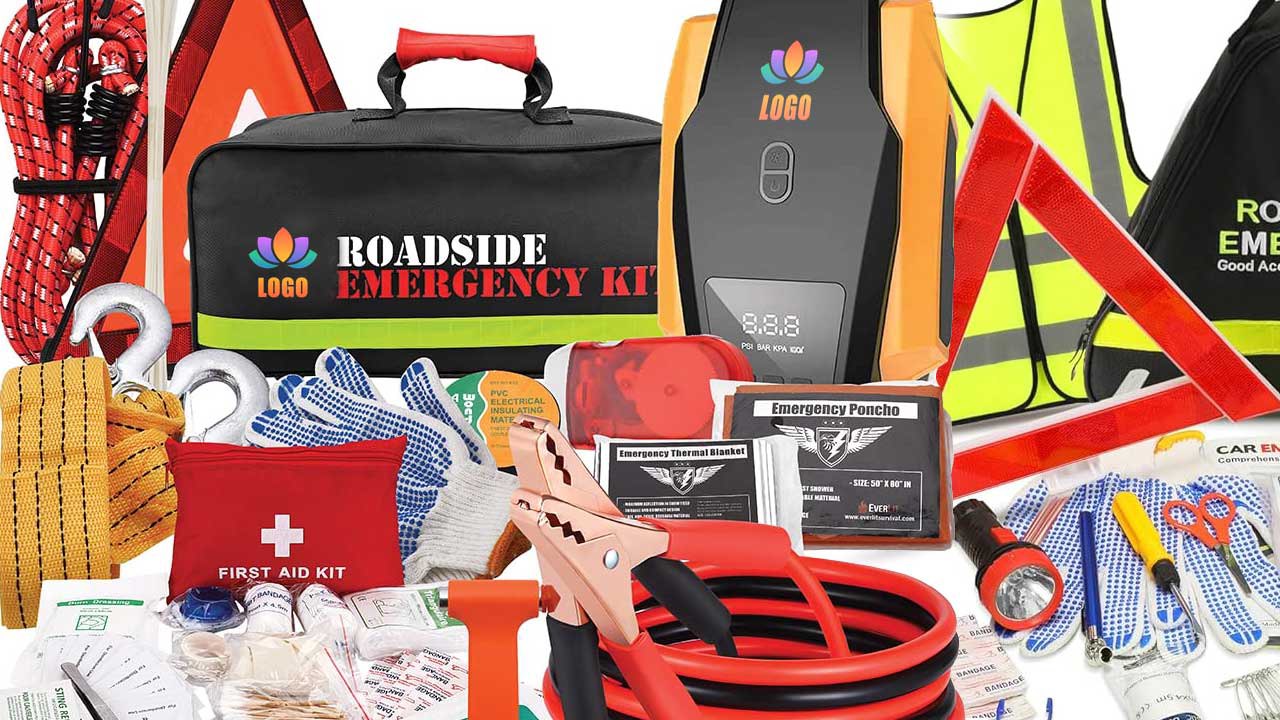
What tools and equipment should Dads insist their sons, daughters and wife carry in their car? Our list might surprise you.
My Dad taught me all the skills I needed to keep a car running, but of course, when I did break down, I was never able to fix the car by the side of the road. So I always carried a bag of change, so I could walk to a phone box and call my dad to come bring a tow-rope. At least these days our kids all have phones, which will save them a walk.
Tow-ropes and jumper cables are not so universally useful with modern cars, and they do take some knowledge on how to use them. Although that knowledge is readily available on the internet for them to look up, in this list I won't be recommending that kind of item.
So my first piece of advice is to consider Breakdown cover. The basic service starts at around £10 a month per car, and if you have three or more cars in your family, it may be worth family cover at around £20 per month.
What is #EDC?
When I was a child, my Great Uncle Gus told me that a gentleman always carries a pocket knife, a handkerchief and a comb.
Seems I wasn't the only one given this kind of advice and over the last few years, Every Day Carry, or '#EDC' has become something of a thing, with men sharing photos and videos of the useful things they always carry in their pockets every day.
The serious aficionados of EDC will have a Summer EDC, a Winter EDC, Day off EDC, Work EDC, Urban EDC, etc. Obviously, it was only a matter of time before EDC for your car became a thing.
There are already plenty of car EDC articles out there, but many of them come from over the pond, where your EDC could literally save your life. While carrying bear-repellant, a chainsaw and a portable generator maybe useful advice if you live in Alaska, it's less relevant in Cambridgeshire.
Having already revealed what kind of guy I am, you may not be surprised to know I have a Car EDC, but not because I jumped on the trend. I have been driving for over thirty years, I have had children who have grown up, I have been around the car industry most of my life, and over this time there are certain things I have found useful to keep in your car.
Dad Advice
So I have created a list, with the specific purpose of being Dad Advice. My thinking is, if you have a daughter, and she just got her first car, what would you advise her to keep in the boot of her car?
This isn't really about being equipped for if you break down by-the-side of the road, although this list may help. These items will help with day-to-day issues like muddy feet and impulse buying. So here goes, in order of availability and importance.
1. A Blanket - Big and Thick
Hands down, this is my top pick! Your mind probably goes to all the obvious things, such if you break down in the cold, you can use it to keep warm. Or if you are picking Granny up, she can put it over her knees because she feels the cold. Well, that's seldom going to happen.
However, if you have a blanket in the car, you will find yourself using it all the time, mainly to wedge stuff in. When you are at the craft fair, and you can't resist that vase, how are you going to transport it safely? You can use the blanket to wrap it in, wedge it behind the seat etc. The same goes for the picture frames you bought with sharp metal edges, use the blanket to protect your upholstery.
It has other uses, if you are caught in the rain, you can use it as a towel. You can throw it over your steering wheel and seat in the summer to stop them getting red-hot. You can protect your leather upholstery from wet dogs with sharp claws or kids covered in suntan lotion (suntan lotion and hair gel will stain leather).
And, of course, you can use it as a picnic blanket. There are no end of uses for a good thick wool blanket, and no car should be without one.
2. Thick Black Bin Liners
The second spot on my list is a no-brainer too. I'm sure there is a pocket in the boot when you could store a whole roll, but just having two takes up no space at all. When you need them, you will be glad you had them.
Once again, they are fantastic for those impulse buys, such as when you are in the garden centre and just must have that Mock Orange Tree in the muddy pot. Or when you remembered to take your wellies with you to the woods, but now you have muddy boots and nowhere to put them.
Essentially, a good sturdy bin liner can protect your car from messy, or potentially messy things. I recommended using bin liners in a previous article about spilled paint in cars, and there are too many things to mention that it would be wise to transport inside an extra sealed bag.
And of course, it's a bag. You can put anything in it, should you decide to collect seashells or conkers. You can even use it for it's intended purpose and collect rubbish in it.
If you have something to cut it open with, you can also turn it into plastic sheeting, but we will cover tools later.
3. Gloves - Three Pairs
The first pair of gloves continues the theme of protecting your car from mess, which is why I would recommend some disposable rubber gloves.
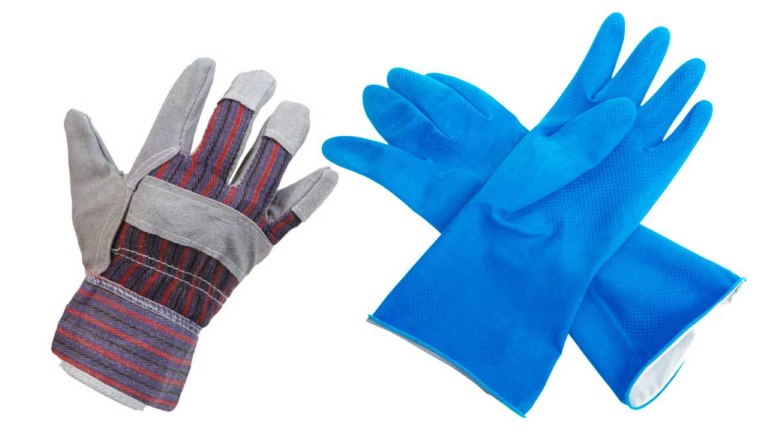
The Nitrile disposable gloves that everybody from mechanics to doctors wear are okay, but they come in a box of a hundred, and they do go off if left in a hot car. If you have access to them and can replace them regularly, then they will do fine. But a better option is probably a pair of Marigold style washing up gloves.
These too will get sticky in a hot car and most likely only last a year, but most supermarkets sell their own brand in multipacks, working out about a pound a pair. They are thick, strong, and should you be out-and-about, and find that you need to handle something messy, disposable gloves are a better option than trying to wash your hands.
Next, I would recommend a pair of heavy-duty gardening gloves. These are more for your protection, for when your brother-in-law says, "While you're here, help me move these paving slabs round the back".
Having never been a woman, or given it a go, I am uncertain if this kind of scenario ever happens to young ladies, but I'm sure there are times when anyone would find it useful to have a good sturdy pair of work gloves in the car.
Finally, continuing the theme of looking after yourself, I would just recommend keeping a pair of warm gloves in the car. There are just times, when it's colder than expected, and the wind chills your fingers to the bone, it's good to have a pair of gloves.
Of course, you can continue the theme and carry a scarf and woolly hat, spare dry socks, a spare hoodie and a waterproof jacket or poncho, of the kind that stuffs into a little bag. You can even get disposable rain ponchos for very little money. A car is a wardrobe with plenty of room, and seldom very far from where you are. In some ways, it's silly not to carry with you a spare change of clothing.
I don't need to tell the ladies this because in my experience, most of them fill their car full of shoes, but it pays to have spare canvas shoes in the boot, or even a pair of slippers in case you end up visiting somebody who insists you take your shoes off at the door. It will do us all a favour because if you are a teenager, chances are your feet stink - it's your age, you'll grow out of it.
4. Disposable Hand Wipes & Tissues
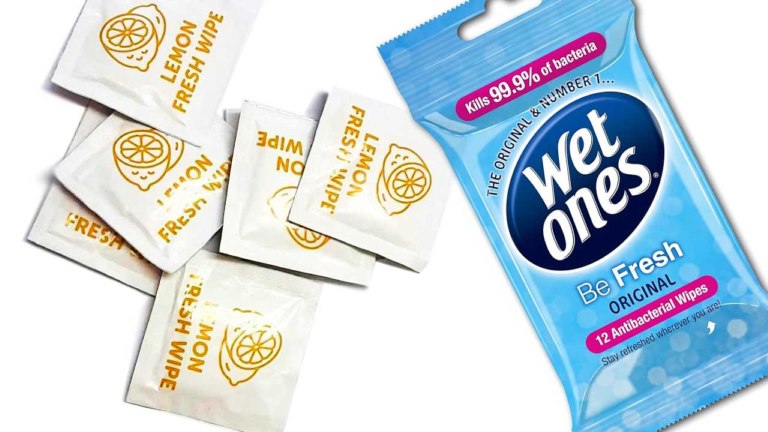
I shouldn't even need to explain these, and anyone who has had kids will likely already have a packet of baby wipes and a packet of Handy Andies nearby.
You need them for cleaning your hands, wiping your nose, and other things. They are available from your local supermarket and they are cheap. Even if you buy lemon scented posh hand wipes on eBay, they are still fairly cheap. There's no excuse not to have them in the glove box.
Top Tip: There are special wipes you can get for birds mess. ~ "Don't be silly, he'll be miles away by now"
Dad-jokes aside, we cannot recommend these products highly enough. Bird's mess contains all sorts of corrosive compounds which can etch into your paintwork, so even if you are able to remove it quickly, it may not be enough to prevent damage over time as the compounds have soaked into your paint. A bird-mess remover neutralizes the chemicals and prevents nasty bird's mess marks. These products occasionally come as a wipe in a sachet, but more commonly in a small spray bottle. Highly recommended.
5. Insulated bag
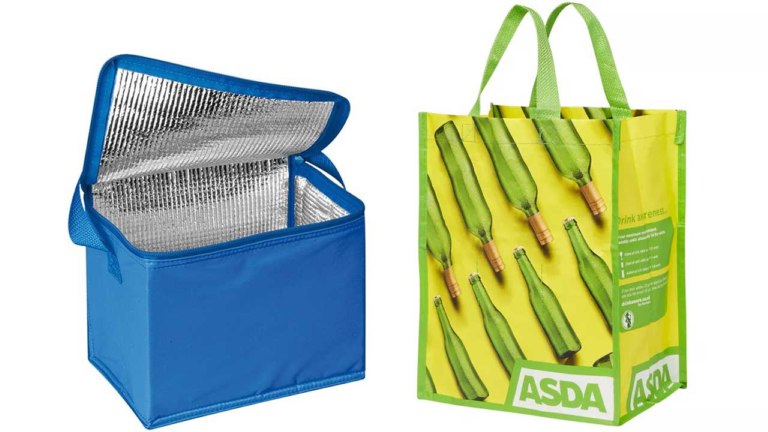
It's a great idea to head down to your local supermarket and buy one of their shopping bags -- the insulated ones with a zip on the top. These fold up fairly small and don't take up much space.
But if you prefer, you can buy yourself a fancy one with a pattern that looks nice. Or you can even get one of the large ones that fast food delivery guys use.
You now have a spare shopping bag in your car should you need one, and they keep hot things hot, and cold things cold. Not forgetting, you also have a big blanket you can use for insulation, your ice cream should stay cold all the way home.
6. Glass cleaning and Cold Weather Kit
Let's get this out of the way at the start. Driving with steamed up or frosted windows could be a criminal offence.
The Road Vehicles Lighting Regulations 1989 regulations 23 & 27 and the Highway Code states that "windscreens and windows MUST be kept clean and free from obstructions to vision". Failure to do so could lead to a hefty fine, a driving ban, or if you end up hurting someone, even a custodial sentence. Serious stuff!
So many people trot down to Halford's, buy a can of de-icer and a silly plastic thing for scraping their windows. But not us, we will get this right. Let me tell you what you need.
a. Two good quality, microfibre window cloths - large
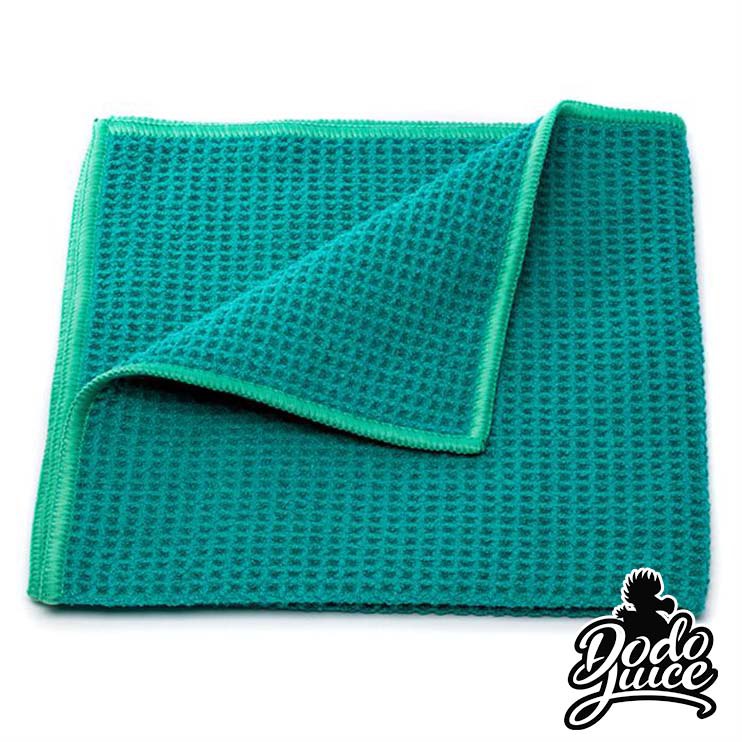
Microfibre clothes are fantastic. They make them with a special weave for cleaning windows, these are the bomb (as I believe the kids are saying). Two is better than one. When one gets wet, the other is dry. If you need to wash and dry one, you still have one in the car. If you have a passenger, you can have one each, and they do their side while you do yours, it saves you leaning over them... although, on a cold night, they might enjoy it. You do you.
Also, should you have a spillage and need a cloth to clean it up, one cloth is seldom enough. Two is better.
Top Tip: Never try to clear your window with your hands, especially if you have diamond rings on. That diamond will leave deep scratches in the glass. We have seen it all too often, and it is cause for an MOT fail. So if you are looking at the price of large microfibre cleaning cloths thinking they are a bit spendy, just consider that they are far cheaper than a replacement windscreen.
b. Glass Cleaner
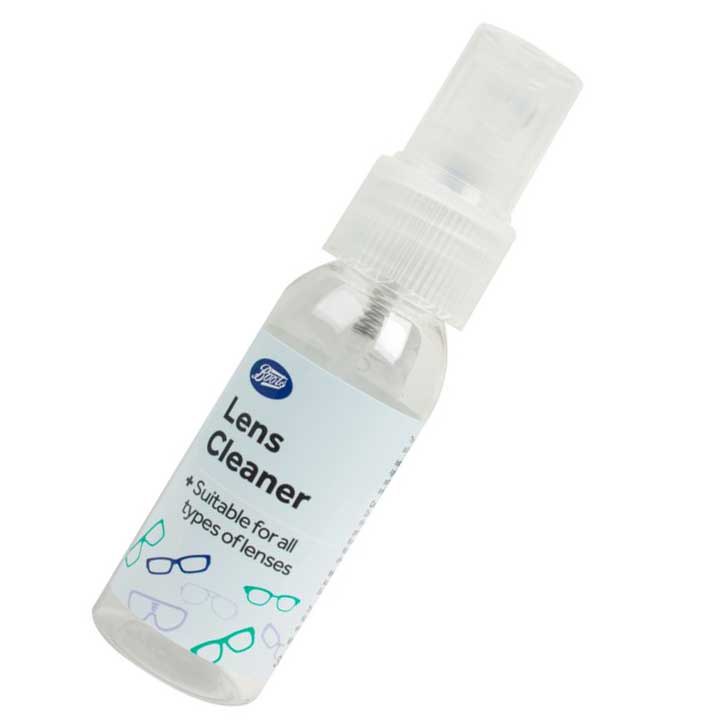
There are a zillion glass cleaners. There are ones specifically for cars, although the household ones will do the same job. But instead, I recommend going to the opticians and buying a small pump spray cleaner designed for spectacles.
You really don't need a great big trigger spray bottle to clean car windows. You certainly don't need it sliding around in your footwell, where eventually it will get stepped on, the top broken, and the contents spilled all over the floor. Nor do you want to keep it in the boot, meaning you have to go get it because you won't, because you are in the car now with your seatbelt on, and it's cold outside.
No, you need it in that door pocket where you will keep your glass cloth. The small bottles of glass cleaner they sell in opticians take up no room at all. Trust an expert, when it comes to glass cleaner, less is more. Most people, given a big bottle of glass cleaner, will mist it all over, then spend ages trying to dry it all off. But just two pumps from a small bottle is enough to do a smeary windscreen.
Top Tip: If you find yourself chasing smears or grime around your glass, then your glass needs a wash. It may sound strange, but if your glass needs a wash, then glass cleaner won't work and could make things worse. Glass cleaner is good for getting rid of smears and some of that film that builds up, but once they are grimy on the inside, you need to wash them with a damp cloth and soapy water.
c. Dustpan and Brush
This simple bit of kit, which costs no more than a few pounds in your local supermarket, is superb for clearing windows. It may sound crazy, but you have probably got your fingers dirty picking wet leaves and bits of twig from your windscreen wipers. You have probably near frozen your fingers trying to scrape ice from your windows with a credit card, or tried to clean several inches of snow off your bonnet with a rolled up newspaper. Who's the crazy one?
The brush is good for brushing away leaves and debris from your wipers, and for brushing off loose snow. The pan works very well as an improvised snow shovel and if you get one with the rubber strip along the lip, it makes an good squeegee for clearing rain water from side windows.
As a bonus, you can also use it as a dustpan and brush.
d. Ice Scraper or De-Icer
You will need one or the other, or both.
There are plenty of ice scrapers that work, and many more that don't. Most seem to be complete junk.
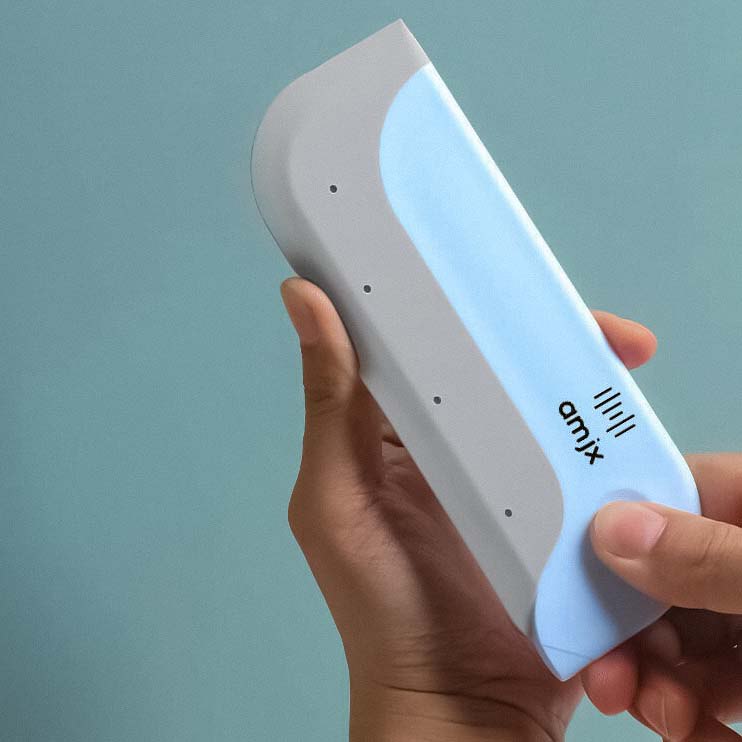
It's actually rather hard to find a good one, most are a cheap piece of plastic which are far too stiff, and I prefer them with a bit of give. There are some really fancy ones with long handles and a brush on one end, there are ones that include a mitten to keep your hand warm and dry. They even do electric heated ones. But frankly, you really want it small enough so it fits in your door pocket. I can only suggest you shop around for something you like. Personally, I think a 'Genuine Skoda Ice Scraper' is a good design. And if it reminds you of something you would use to apply icing to a cake... guess what I use!
I suffer from a touch of arthritis and really don't like letting my fingers get cold, which invariably happens with ice scrapers. That's why my personal preference is for a liquid de-icer, but not one in an aerosol can; I much prefer the ones in a trigger-spray, which leads me to the next thing on the list...
e. A Plastic Box
As I mentioned with the glass cleaner, trigger spray bottles have a nasty habit of breaking and spilling their contents all over the carpets. So if you want to keep De-icer, Glass Cleaner, Bird Muck Remover, other liquids, pans, brushes and ice-scarpers, from rolling around all over the floor, breaking or getting spilled, I recommend a box.
The supermarkets sell plastic storage boxes with a lid for £5-£7 pounds. Ideal for the job, the only problem is that now you have a box sliding around in the back of your car. But the supermarket is also likely to sell those self-adhesive felt pads, put a few of those on the bottom, and it shouldn't slide around. If it tips over, it means you are taking corners too fast.
Of course, you could keep your kit in a sports style bag too and that would do the job. But a bag is more expensive, and it isn't spillage-proof.
7. Tool Kit
Let's face it, in this day and age, even if you know a bit about mechanics, you are unlikely to be able to fix your car by the side of the road. So I won't be recommending you get sets of spanners and screwdrivers. You need every day tools that are handy to have, and you might actually use on your travels. There's no rule that says that tools you keep in your car, have to be used for car maintenance.
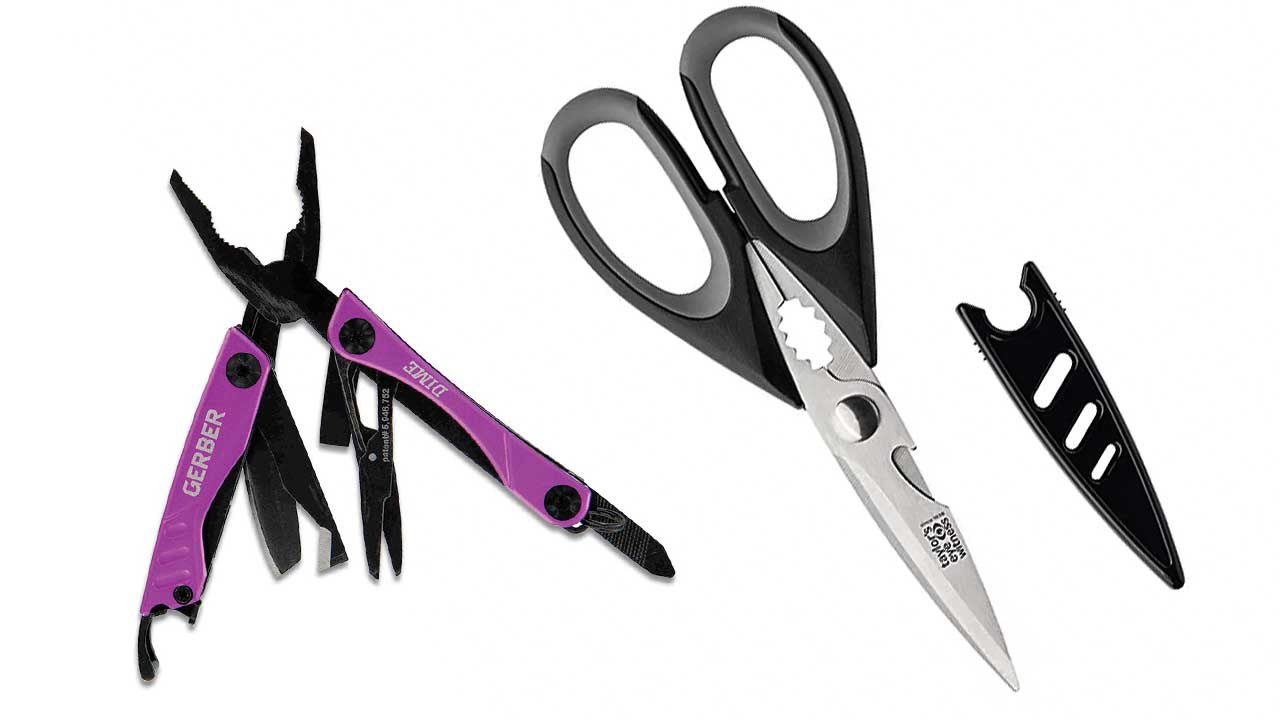
a. Cutting Tool
As already mentioned, I always have a pen knife in my pocket. You would be amazed how often you use it if you have one, and as any survival expert will tell you, a cutting tool is one of the vital pieces of equipment you need to survive any situation, so I have Ray Mears on my side on this one.
But it doesn't actually have to be a knife. In fact, a sturdy pair of Trauma Shears is probably more capable than most knifes and can apparently cut through a car door, which is probably why you see soldiers carrying them in their webbing. Kitchen shears would also do the job.
However, I would also recommend a multi-tool or Swiss Army style knife. These will give you a screwdriver, bottle opener, file and a load of other stuff you didn't know you needed until you did.
b. Pliers
I am not expecting you to do any wiring, but pliers are very grippy. They are good for gripping and pinching things, especially when your fingers are cold.
They are a surprisingly useful thing to have, which is why the aforementioned Multi-Tool is built around a pair of pliers rather than a knife.
c. Cordage
If Ray Mears were helping me write this article, I am sure he would say that cordage was one of the essential survival tools that must not be skipped.
For the uninitiated, 'cordage' means string and rope. And while I can tie a bowline one-handed with my eyes closed, a roll of tape is much more user-friendly.
And so I would include a roll of electrical tape, possibly some packaging tape and/or duct-tape. But depending on what you are likely to be doing, large cable-ties and elastic bungees could be more useful.
d. Torch
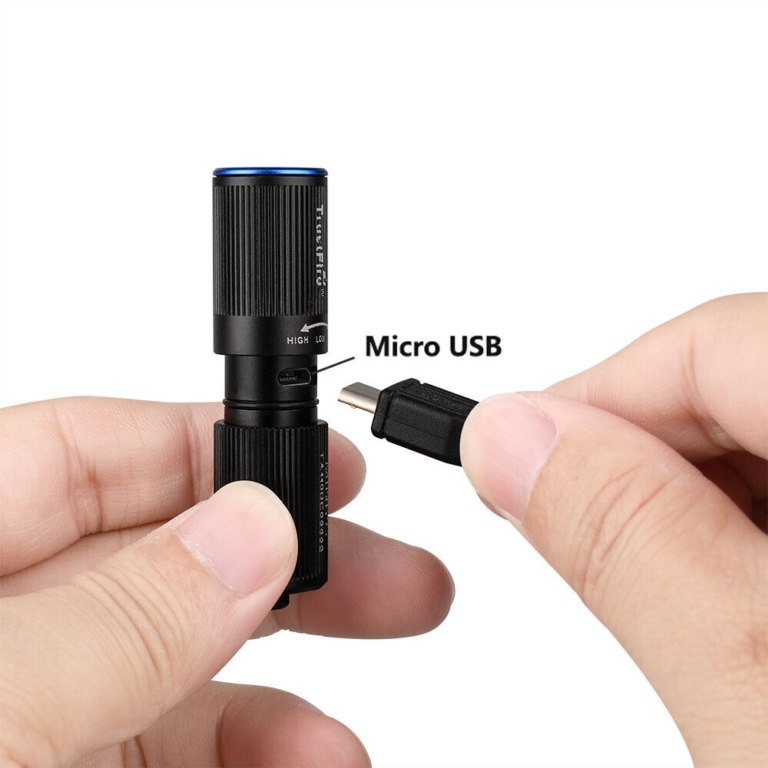
Because it is useful to be able to see in the dark, I would recommend having two torches. In fact, I bought one for my son a short time ago which is small enough to attach to his keyring, but big enough so that you know you have it in your pocket.
A small torch attached to your car keys is very useful, even if you don't go out much after dark, it can help you find that thing you dropped under the desk.
LED torches are really cheap now, and many of them have internal batteries which you charge via USB, which is what I would recommend and brings me to the next item.
e. Spare leads
Dads, back me up on this. The family should have spare leads for all their electrical devices, in the car.
If you are reading this and planning to building your son or daughter, or your wife an EDC kit, think back to how many times they said their phone ran out of charge.
They have a phone, laptop, vape, storage devices, and hopefully a battery bank, and so they should have spare leads for all of these and the idea place for them is in the car. If they are out and about, they take their car. If they are at home, the car is outside on the drive, never far away.
So ensure they have adaptors, something that can plug in and charge from the car. A battery bank and leads for all devices.
8. A large Bottle of Water
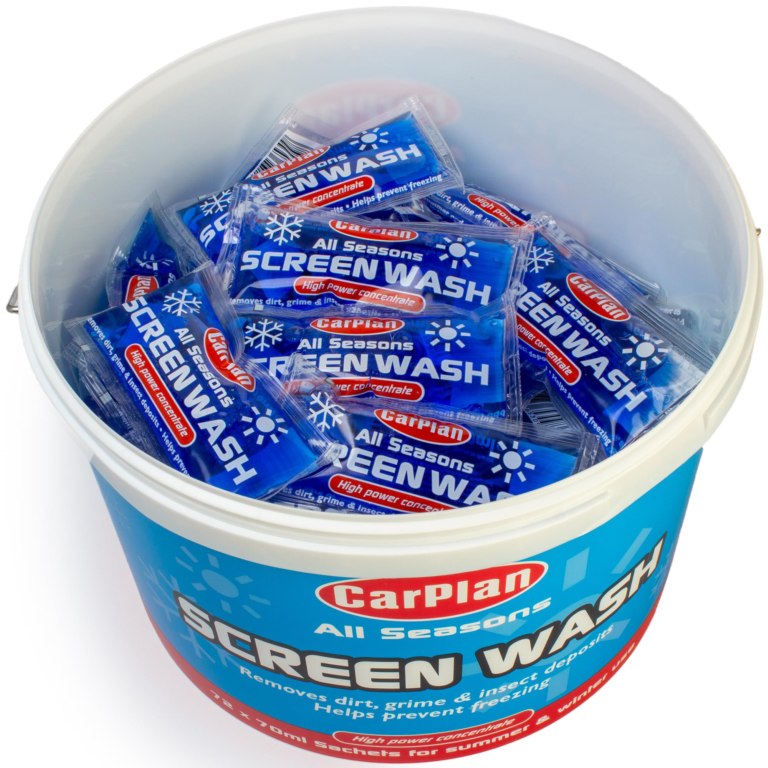
Keeping a big bottle of still water in the car is an excellent idea for three main reasons. Firstly, if you are caught short, you can top up your windscreen washer bottle. This happened to me a few years ago, there was slush and salt on the roads, and driving down the dual-carriage way, muddy spray was building up on my windscreen and my washers ran dry. I was able to pull over and top them up. Of course, this relies on you knowing how to fill your washer bottle!
Just water will get you by but adding screen wash is worth it in the winter as it will help stop it freezing.
Secondly, sometimes there is no substitute for being able to wash off. Having baby-wipes is great, but not much good for washing sand off your toes.
Thirdly, if you have a store-bought bottle of still water, and it's unopened, you can drink it. It's always good to stay hydrated. Which is why, in the summer, I always buy cartons of juice and keep them in the afore mentioned insulated bag which was item No.5.
9. Umbrella
I don't recall ever actually using an umbrella myself. However, I have gone through a considerable amount of them because I keep lending them to people, so in that respect, they are useful.
10. Notepad and Pencil/Pen
But why would you need that? You have a phone, you can make notes on your phone, you even have an app for it.
But you can't leave notes for other people. You might be able to send them the note if you know their number, but what if you don't? It is always good to have analogue as a fallback in your glove compartment.
That's the Basics!
That's my Dad's Advice, EDC kit. The basics you can ensure are in your family's car which is useful, and you know they can actually use. However, there's more, but they have caveats.
First Aid Kit
I'm no expert on medical matters, so I phoned Paul at PB First Aid Instructor, for advice.
I asked him if he could recommend a good first aid kit. I wasn't entirely surprised when he told me that most of them are overpriced junk because I have heard other experts say the same thing*. And that you really need to build your own first aid kit based on your skill level. So buy a basic kit and add in some sealed sterile Ambulance Dressings and a good quality pair of tweezers.
This, of course, begs the question, what is your first aid skill level? It has been something of a theme of this article, that there is no point in filling your car with expensive stuff you don't actually know how to use, and on balance, learning to do first aid is a skill far more useful than learning how to use jumper-cables.
You may be lucky enough that your employer paid for an accredited course in health and Safety and Emergency First Aid and already have a little knowledge - this is exactly the kind of training Paul provides professionally.
He also told me he can do non-accredited training, and can, in fact tailor a course for the specific needs of your household or extended family. If Grandad broke his hip last year and is still a little unsteady, and mum has a bee allergy -- PB First Aid Instructor can provide general first aid training, plus specific training your family may need.
He can also tailor training to whatever activities you enjoy. Camping, hiking, horse riding, gardening, dancing or kick-boxing. Different people may be more or less likely to use different first aid skills.
This training probably won't cost as much as you think, especially when you consider that having the skills to save somebody's life is difficult to put a price on. So I would highly recommend finding somebody in your area, and getting yourself some training. If you are in Chelmsford, give Paul a call.
With that said, you will be required to carry a first aid kit by law when driving in some European countries, and even if you don't have the skills to use them, there could be somebody else on the scene of a motorway pile-up who does.
Top Tip: According to my local pharmacist, carrying an off-the-shelf hay fever and allergy medication; (the chemist's or supermarket's own brand is as good as any), some paracetamol and some indigestion tablets. Between these three items, they will cover most discomfort you or your passengers my suffer. Additionally, Ibuprofen is not only a good painkiller but also helps with inflammation, but some people can't take it. Add to this some antiseptic cream like Savlon or Germolene and you have most of what you need.
If there is a medication you usually take, it might be good to keep a backup stash in your car, but with all the afore mentioned items, don't forget they have a best before date.
Fire Extinguisher
Ten years ago, I wouldn't have hesitated to put a fire extinguisher near the top of the list. Today, however, I have to think about what's likely to catch fire and what would be the cause.
Unfortunately, it's often electronics, many of them with lithium batteries. A phone, laptop or tablet, will vent until it's done and there's nothing you can do to stop it. You can only extinguish the resulting fire. And if it's an electric or hybrid car that goes off... frankly, I think the best option is to run, get up-wind of the fire so you don't breathe in any fumes, and call for the fire brigade.
These fires can be near impossible to put out, have toxic fumes and dangerous fallout.
A fire extinguisher could still be useful, if you know it's and your limitations. But it might encourage somebody to be a hero when they should be getting themselves and others to safety.
Safety Equipment
Many cars will come with a Safety Triangle, as they are required for driving in some parts of the EU, as are Yellow Safety Bibs, the famed gilets jaunes. There are other items which are required for driving in certain countries, you may be required to have two safety triangles, and others require you carry spare sets of bulbs and a fire extinguisher.
Safety Triangles are NOT required by UK law at the time of writing, and their use on the motorway is actually prohibited.
There is a lot of advice about safety equipment on the internet, and frankly, it has even me confused because I know for certain, some of it is misleading or plain wrong. Everybody but me, it seems, now uses AI to write their articles, and it appears that the AI has either confused UK law with EU law, or just repeated the lies of people trying to sell you junk.
I'm not a lawyer, and sorting all this misinformation out is beyond the scope of this article, although I may have to investigate later. And although I might say there's no real harm in equipping your car with junk from Amazon as it's your money to waste; I would hate for anyone to get run over while deploying electric road flares or arrested because they have an imported emergency window breaker, which doubles as a defensive weapon.
As with some other items on this list, there is no point in having tools you don't know how to use, and you should always be aware of local laws where you intend to drive.
Save Money!
I have tried to give you some low-cost, high-value options so throwing together this kit won't be too expensive. It will mean some running around, but most of this stuff can be bought online or from your local supermarket. If you think this is all a good idea and worth the effort, by all means, spend the extra money on a top quality O-Light Torch and a Hudson Bay 100% wool blanket. Ray Mears would be proud.
Of course, you could just buy one of the very many ready-made winter survival kits, or new driver survival kits, but you'll probably be over paying for a load of crap you don't need. A good wool or fleece blanket is far more useful than a foil emergency blanket (although any first aid kit should include several), and if you live up there in the frozen north and feel you really must have a shovel, then get a good quality army surplus one, rather than the cheap Chinese junk they will sell you for twice the price.

Just for Fun
I thought it might be fun to invite you to compare my list to that of Wranglerstar, a famous American Homesteader and constitutionalist, who obviously lives in and is prepared for a harsher environment which includes landslides, blizzards and armed insurrection.
Be like Wranglestar... never leave home without a sense of humour and a positive attitude, it will see you through.
May your journey be smooth, your experiences be rich, and your memories be precious. Stay safe!

by Danny Argent
Always prepared.
Disclaimer

New Again Ltd is not affiliated with any of the products or services mentioned on this page. They are representative, easily available and good value for money. We don't receive kick-backs or commission.
Nor does Ray Mears actually endorse this guidance, although we are sure he'd approve, and we think he's awesome. Buy his books!
Related Blogs
Here are some more of our latest #CarCare blogs
Snake Oil
There was a time when there was a lot of snake oil in the car care industry. If you were to visit the detailing enthusiast forums, you would see lots of scepticism.
Read ArticleWhy you shouldn't start a car detailing business
While browsing forums, I often see the question, "How do I start a car detailing business?" But transition from enthusiast to professional isn't easy.
Read ArticleNature - Destroyer of cars! Part 1 - The Birds
One of the most common types of damage we see on car paintwork is caused by acid-etching from bird droppings.
Read ArticleWhy you should use professional car detailing
The one thing you will want to look after as much as your home is the car. To make this a reality, you should rely on our services. We are the best in the business when it comes to restorative valet detailing Chelmsford has. As long as we are on the ...
Read Article
Can We Help You?
"We can offer specialist advice on the best car service to suit your requirements"
When bringing your car to New Again, we often ask you to explain exactly the reason for having your car Protected, Valeted or Repaired. Once we understand exactly what it is you are trying to achieve, we will appraise your vehicle using our detailed appraisal check-sheet allowing us to identify areas of concern and tailor specific services that match your requirements and budget.
If you are not sure what service you need and would like to speak to one of our technicians, simply request a callback by filling in the form on our contact page.

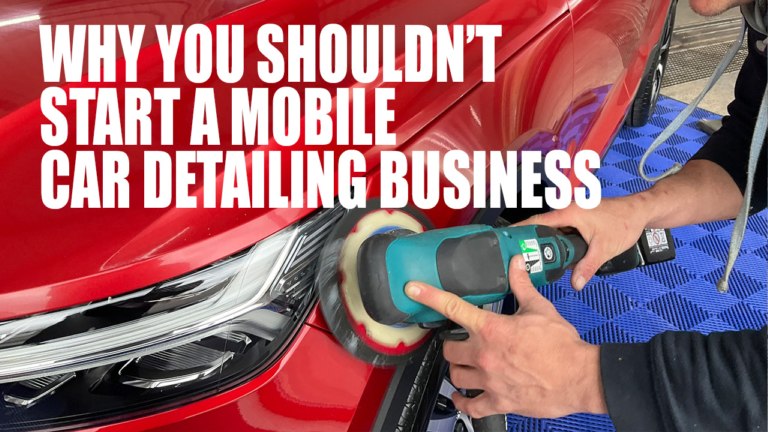
.JPG)
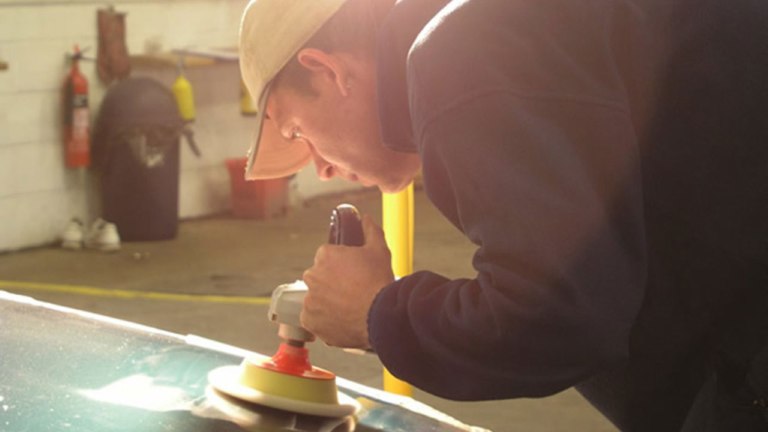
Share this blog